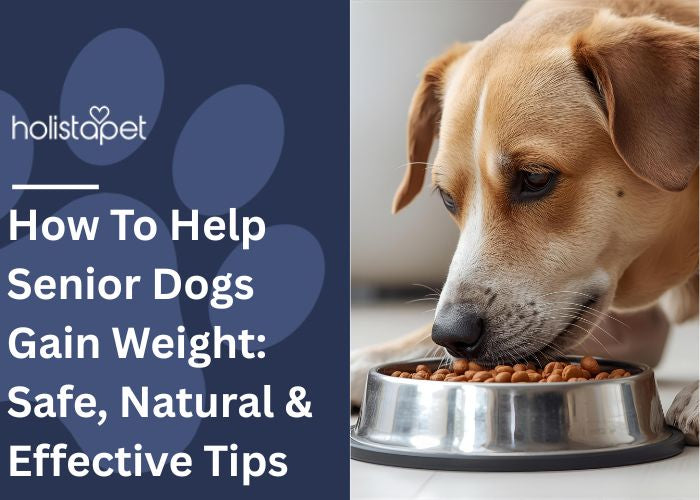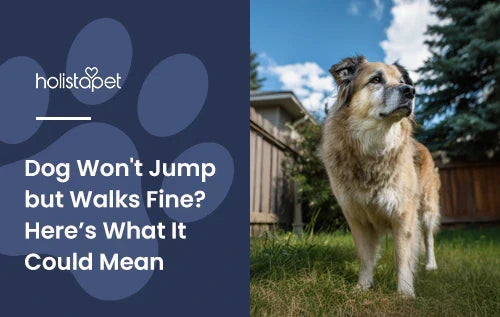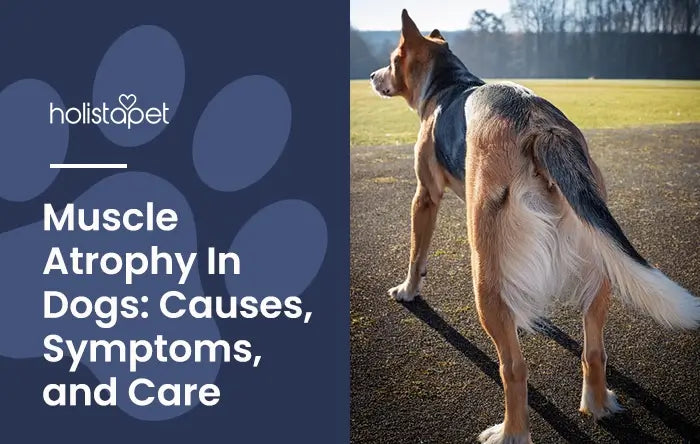Every aging pup tells a story, and sometimes, that story includes weight loss. Learning how to help senior dogs gain weight starts with simple changes in their diet and routine.
High-quality dog food, a smart feeding schedule, and gentle exercise can bring back muscle mass and body strength in particularly very old dogs. Their tail wags may come slower these days, but some strength and comfort can still shine through.
Understanding Weight Loss in Senior Dogs

An old pet's weight loss often happens because their bodies change with age. As dogs grow older, they may metabolize food slightly differently. This can cause them to gradually lose weight. Even healthy seniors may eat less or consume fewer calories.
A pup's current health status can also affect their weight. Ongoing issues, smaller meals, or trouble absorbing nutrients can all make an older dog lose weight. Catching these changes early helps prevent bigger problems later.
Common Causes of Weight Loss in Older Dogs
An older dog's weight loss can happen for many reasons, and it's helpful to know the most common ones. Spotting these causes makes it easier to choose the right care for their condition:
- Decreased Food Intake. Aging canines sometimes eat less because their appetite changes.
- Underlying Health Issues. Kidney issues, liver diseases, or other ongoing medical conditions can affect weight.
- Nutrient Malabsorption Disorders. The body's ability to absorb nutrients can weaken with age, causing older dogs to lose weight slowly.
- Dental Discomfort. Soreness in the mouth makes chewing food harder.
- Muscle Loss or Muscle Atrophy. Dogs tend to lose muscle as they age, especially if they move less.
Signs Your Aging Dog Needs to Gain Weight
An older dog's body often shows early signs when extra care is necessary. Knowing what to watch for helps you act before weight loss becomes too serious. Watch for the following red flags:
- Visible Ribs or Spine. If bones stand out, your dog may need to gain more weight.
- Loose Skin and Less Muscle. Muscle loss can make skin look saggy.
- Low Energy. A dog that tires quickly or rests more than usual may lack strength.
- Poor Coat Condition. A dull or thinning coat can signal a lack of nutrients.
- Loss of Appetite. Eating smaller meals or skipping food points to changes in health.
The Importance of Healthy Weight for Senior Dogs

Staying at an ideal weight helps older pups keep their strength and mobility. Even truly geriatric dogs benefit from a weight range that supports their joints and muscles. When a dog is too thin, they may experience more soreness or loss of energy. Keeping track of their weight makes it easier to spot changes early and adjust their care plan accordingly.
What Are the Risks When Dogs Lose Weight?
Older dogs that drop weight suddenly can face serious health problems. Even gradual weight loss puts stress on their body and lowers their energy. Keep an eye out for these risks:
- Weak Immune System. A thin body may struggle to fight off illness.
- Muscle Loss. Less muscle mass makes it harder to stay active.
- Ongoing Health Issues. Weight loss may worsen kidney disease or liver disease.
- Low Energy. A drop in strength can limit play and daily activity.
- Digestive Trouble. Stomach troubles may grow worse without proper nutrients.
What Are the Benefits of Reaching a Healthy Weight?
Helping your aging pet reach an ideal weight improves both their comfort and happiness. Even healthy senior dogs feel the difference when they maintain the right size. Here's what they normally experience:
- Better Energy Levels. Dogs regain stamina for play and walks.
- Stronger Muscles. Extra weight in the form of muscle supports mobility.
- Shinier Coat. Proper nutrients keep skin and fur looking healthier.
- Improved Digestion. Better metabolism, paired with more easily digestible food, helps the body use nutrients well.
- Longer Comfort. Reaching a normal weight supports normal health and quality of life as dogs age.
How To Feed an Old Dog: Best Ways To Promote Weight Gain
Feeding an older dog facing weight loss needs careful planning. These methods help promote safe weight increase in our senior companions:
- Adjusting Your Dog's Feeding Schedule and Portion Size
- Prioritizing High-Calorie, Nutrient-Dense Foods
- Adding Healthy Fats and Proteins to Your Dog's Diet Plan
- Choosing Supplements That Support Muscle and Weight Gain
Adjusting Your Dog's Feeding Schedule and Portion Size
Feeding an older dog smaller meals more often is more beneficial for them. Breaking food into several feedings makes it easier for their body to use nutrients. This steady approach also helps senior pups add muscle mass while alleviating constipation issues.
Pay attention to your dog's health status when planning meals. A wellness checkup with your vet can guide the right portion sizes for their age and weight. Over time, these changes can help them reach an ideal weight safely and comfortably.
Prioritizing High-Calorie, Nutrient-Dense Foods
Seniors put on weight more easily when their meals contain high-quality calories. Premium dog food with balanced protein and moderate fat content supports both body weight and muscle mass. These foods are often more easily digestible, which aids nutrient absorption.
Adding high-calorie, nutrient-dense options can improve your dog's body condition. This approach gives aging pets the fuel they need to rebuild strength. Over time, the right diet helps them maintain a normal weight range.
Adding Healthy Fats and Proteins to Your Dog's Diet Plan
Adding high-quality fats to your dog's meals brings them extra calories without forcing them to eat larger amounts. Ingredients like fish oil or coconut oil can make food more appealing while supporting weight increase. These fats also help the body store energy for daily use.
Proteins are just as important. They help dogs add muscle mass and keep strength as they age. Choosing foods with strong protein sources supports their specific needs and makes gaining pounds easier.
Choosing Supplements That Support Muscle and Weight Gain
Wellness products can give senior canines a boost when food alone isn't enough. The right choices help their bodies use nutrients better and support steady weight increase. Supplements can also support muscle growth in aging pups.
Look for options made with natural ingredients that support energy and digestion. A product designed for weight and muscle mass gain can improve protein efficiency. Adding these to your pet's diet makes it easier to maintain their strength and comfort.
Exercise and Weight Gain in Aging Dogs

Gentle activity helps older dogs keep their strength while putting on weight. Low-impact exercise, like short walks or light play, supports increased muscle mass without stressing the joints. How much exercise your pooch needs depends on their body's ability to move. Keep things gentle and don't force it.
Rest matters, too. Balancing activity with plenty of sleep lets the body store fat and rebuild muscle effectively. This mix of calm time and steady exercise makes putting on weight safer and more effective for our older canine friends.
HolistaPet Muscle Support Soft Chews for Dogs: A Natural Choice for Senior Dogs
Senior pups need extra help to keep muscle mass as they age. Our Muscle Support Soft Chews give them a tasty way to stay strong. Made with amino acids and other natural ingredients, these treats back up your dog's lifestyle.
Each heart-shaped chew comes in peanut butter and banana flavor that dogs love. With 100% all-natural ingredients, they support strength, comfort, and overall well-being. They make putting on weight feel rewarding for every aging canine.
Additional Natural Remedies if Your Dog Is Losing Weight
Natural care can support weight increase in senior pets alongside a balanced diet. Here are other options you can try:
- Herbal Support Options. Gentle herbs like chamomile may calm upset stomachs, while milk thistle can support liver health. Slippery elm is sometimes used to help ease stomach troubles and improve digestion.
- Probiotics and Digestive Health. A healthy gut improves nutrient use and weight gain. For a trusted option, our Probiotic Soft Chews feature nine strains of beneficial bacteria and a tasty pumpkin and sweet potato blend. These chews help ease stomach troubles and support nutrient absorption, helping your pup's body get more from every meal.
- CBD Dog Treats + Joint & Mobility Care – Our CBD Mobility Treats combine CBD with turmeric root, boswellia, and hemp seed powder to ease joint stiffness and promote comfort. For older dogs, reducing joint discomfort and improving mobility may encourage a better appetite and more consistent eating. See all Holistapet CBD options here.
Maintaining Your Senior Dog's Weight Long-Term
Keeping weight steady in older dogs takes regular care. Wellness exams at the vet clinic help track a pet's condition and catch changes early. A vet can run blood glucose tests or routine checkups to paint a clear picture of your dog's current health status and get any underlying health issues diagnosed.
Long-term success also comes from daily habits. Stick to a balanced diet, schedule meals at steady times, and match exercise to your dog's ability. These steps keep weight and muscle mass stable as senior dogs age further.
Related Post: How To Care for a Senior Dog [Nutrition, Health, & Comfort Tips]
FAQs About Helping Senior Dogs Gain Weight
Pet parents often panic when their senior pets start rapidly losing weight. That's a valid reaction. What can help is the right information. Let's discuss some common concerns from pet parents, so you can support your pup with knowledge and confidence.
How long does it take for a senior dog to gain weight?
Most older dogs need several weeks to show healthy weight gain. The speed depends on the pet's current health status and how much muscle mass they've lost. Small, steady gains are safer than rapid weight increase. With consistent meals and the right diet plan, you'll see progress over time.
Can certain medical conditions prevent weight gain?
Some ongoing health issues can make weight gain harder. Liver disease, maldigestion disorders, and kidney problems may interfere with how the body uses food. A wellness exam and accurate diagnosis are important before adjusting the affected dog's diet. This makes sure the plan supports their specific needs.
Should I give my senior dog puppy food to help them gain weight?
Puppy food has more calories, but it's not always the best choice for older dogs. Seniors need moderate fat content and easily digestible food to support their condition. Puppy food may upset digestion or add too much fat. Instead, you can choose premium dog food made specifically for aging dogs.
What's the best way to monitor progress at home?
Weigh your dog regularly and note changes in their body condition. Watch for signs like stronger energy, fuller muscles, and a shinier coat. Keep track of their appetite, sleep, activity, and comfort levels. Regular updates give you clear proof of progress between vet visits.
Wrapping Up: Helping Senior Dogs Gain Weight
Helping an aging pup gain more weight takes patience, steady care, and the right plan. Small meals, nutrient-rich food, and gentle exercise all add up to better strength and comfort.
HolistaPet products, like our Muscle Support Soft Chews and Probiotic Soft Chews, make the process easier and more natural. With the right support, your older bestie can enjoy a healthy weight and brighter days ahead.
Continue Exploring More Dog Care Tips Here.


 CBD Oil for Dogs - Fast Acting
CBD Oil for Dogs - Fast Acting
 Chicken Flavored CBD Oil For Dogs - Easy Dose
Chicken Flavored CBD Oil For Dogs - Easy Dose
 Salmon Flavored CBD Oil For Dogs - Highly Rated
Salmon Flavored CBD Oil For Dogs - Highly Rated
 CBG Oil for Dogs and Cats - Loved by Thousands
CBG Oil for Dogs and Cats - Loved by Thousands





Leave a comment
All comments are moderated before being published.
This site is protected by hCaptcha and the hCaptcha Privacy Policy and Terms of Service apply.